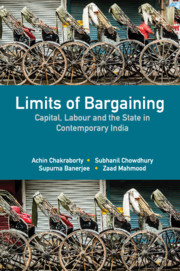Book contents
- Frontmatter
- Contents
- List of Tables
- List of Figures
- Preface
- 1 Contextualising Trade Unions and Collective Bargaining
- 2 Collective Bargaining in India: An Overview
- 3 Everyday Processes of Collective Bargaining in West Bengal
- 4 Industrial Stagnation due to ‘Labour Militancy’? A Critical Look at the Macro Evidence
- 5 Trade Unions and Working-Class Politics in Contemporary West Bengal
- 6 The State and Collective Bargaining
- 7 Conclusion
- References
- Index
1 - Contextualising Trade Unions and Collective Bargaining
Published online by Cambridge University Press: 05 June 2019
- Frontmatter
- Contents
- List of Tables
- List of Figures
- Preface
- 1 Contextualising Trade Unions and Collective Bargaining
- 2 Collective Bargaining in India: An Overview
- 3 Everyday Processes of Collective Bargaining in West Bengal
- 4 Industrial Stagnation due to ‘Labour Militancy’? A Critical Look at the Macro Evidence
- 5 Trade Unions and Working-Class Politics in Contemporary West Bengal
- 6 The State and Collective Bargaining
- 7 Conclusion
- References
- Index
Summary
Motivation and the context
This book primarily examines the status of trade unions and the collective bargaining institutions in the urban labour market of West Bengal (WB) within an analytical framework that views capital–labour relations as an outcome of the interplay of the triad of market, technology and the state with its collective bargaining institutions. The framework that we have adopted here is sufficiently general in the sense that it is capable of explaining capital–labour relations elsewhere as well. West Bengal is the only state in India that had been, until recently, under left rule for more than three decades, and has long been known for its pro-worker stance. The analytical strategy that has been adopted in this book allows us to move back and forth between the general context of weakening of trade union power as a consequence of the changing scenario in the national and global economies on the one hand, and the specific context of a subnational region like the state of WB within the federal system of India, on the other. The regional focus of the study is motivated by the understanding that distinct differences in labour market conditions and in the associated complexities of labour institutions do exist across subnational units in a large developing country like India. Differences at the subnational level in economic prosperity, degrees of urbanisation, structural changes as reflected in the changing shares of primary, secondary and tertiary sectors in total output, and employment—all influence the labour market, labour organisations and collective bargaining outcomes. It can be argued that trade union organisations largely derive their characteristics, heritage, identity and strategic options from the specificities that characterise the region in which they function. This diverse array of influencing factors, which can roughly be called ‘economic’, influences and is further influenced by the political, social and historical factors. Understandably, the way all these factors are supposed to interact to produce the trajectory of capital–labour relations in a subnational context is not easy to delineate, as they pose difficult methodological challenges.
- Type
- Chapter
- Information
- Limits of BargainingCapital, Labour and the State in Contemporary India, pp. 1 - 13Publisher: Cambridge University PressPrint publication year: 2019



